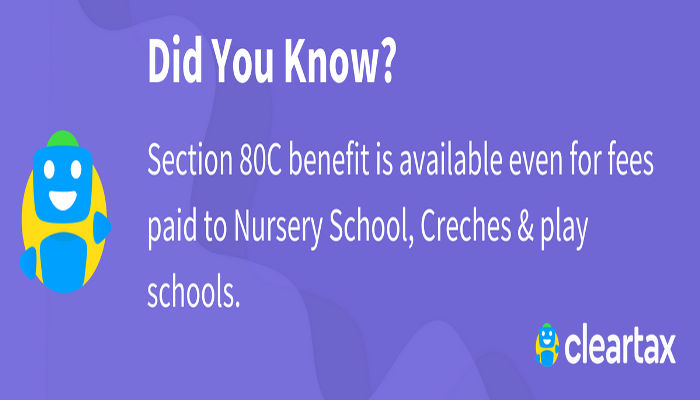Tax Benefits on Children Education Allowance, Tuition Fees & School Fees
Section 10(14) of the Income Tax Act provides exemption on children education allowance. Tution fees are considered for exemption, and this exemption is available only under the old regime.
Key Highlights
- Tax Regime: Exemption available only under the old tax regime.
- Ceiling Limit: Rs. 1,200 per child for maximum two children. (Rs. 2,400 per year)
- Fee Exemption: This exemption is provided for fees paid to nursery, creches and playschools as well.
What is Children Educational Allowance?
The Children's Education Allowance (CEA) is a type of allowance provided by employers to support the educational expenses of their employees' children.
Under the old tax regime, this allowance is eligible for a small exemption, providing limited relief to salaried individuals. However, under the new tax regime, such exemptions are not permitted, as the structure is designed with lower tax rates but without most allowances. This means that employees choosing the old regime can claim tax relief on the Children's Education Allowance.
Applicability of Children Education Allowance
The exemption limit and applicability of Children Education Allowance are governed by Section 10(14)(ii) of the Income Tax Act, 1961, as explained below:
- Eligibility: Available to salaried employees for their children's education.
- Number of Children: Allowed for a maximum of two children.
- Exemption Limit:
- Rs. 100 per month per child (i.e., Rs.1,200 per year per child).
- Maximum for two children = Rs. 2,400 per year.
- Additional Hostel Expenditure Allowance: If the child is staying in a hostel, employees can also claim up to Rs.300 per month per child (a maximum of two children = Rs.7,200 per year).
- Maximum Age: No maximum age.
- Institution: Any university, college, school or other educational institution situated in India.
Deduction on Tuition Fees under Section 80C
- A parent can claim a deduction for the actual amount paid as tuition fees to a university, college, school, or any other recognized educational institution for the full-time education of up to two children.
- This deduction is specifically allowed for tuition fees only and does not cover payments such as development fees, donations, transport charges, or any similar expenses that are not eligible under Section 80C.
Eligibility of Tuition Fees Deduction Section 80C
Persons paying any sum/fees towards the education of their children can claim tax deduction under Section 80C, subject to the satisfaction of certain conditions, which have been enumerated below:
- Number of Children: Deduction up to fees paid for 2 children can be claimed.
- Maximum Limit: Rs 1.50 lakh every financial year (2 children combined).
- Mode of Deduction: The deduction is available only on tution fees paid during the financial year. If payment is pending, deduction is not allowed.

Non-eligibility of Tuition Fees Deduction Section 80C
- The deduction is not available for payment towards part-time courses.
- The deduction is not available towards payment made for school fees of self, spouse, brother or sister, father or mother or any other relative.
- Fees paid to a foreign university situated outside India are not eligible for this deduction.
- This deduction is not available under the new regime.
How to Claim Tax Exemption for Children’s Education Allowance and Tuition fee Deductions?
Individual taxpayers can claim income tax exemption for children's education under Section 10(14) and tuition fees deduction under Section 80C.
For Salaried Individuals
- Salaried individuals must submit the fee receipt issued by the schools or institutions to their employer by year end at the time of investment proof submission. They must also declare it in Form 12BB.
- Even if you have not provided the declararion to your employer, you can claim the exemption at the time of filing the ITR.
For Non-Salaried Individuals
- A person who is not a salaried employee can claim only the tuition fee deduction under the VI-A schedule under Section 80C.
- The non-salaried taxpayers are not required to submit any bill while filing ITR.
- Nevertheless, they should keep the receipts as evidence to back their claims.
It is important to mention here that children's education allowance, which is part of the salary structure, and tuition fees are both different deductions. Therefore, these deductions can be claimed separately as per the limits discussed above.
